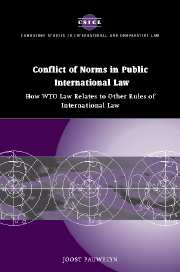 Conflict of Norms in Public International Law
Conflict of Norms in Public International Law Published online by Cambridge University Press: 07 July 2009
[T]he system of international law consists of erratic parts and elements which are differently structured so that one can hardly speak of a homogeneous nature of international law. This system is full of universal, regional or even bilateral systems, subsystems and sub-subsystems of different levels of legal integration.
We start this chapter with a description of some of the features of the sources of international law that may complicate an examination of conflict of norms in public international law. We then ask whether there are any a priori hierarchies in international law and, thereafter, examine the principal sources of international law as they may play out in a conflict of norms. We conclude the chapter by redefining international law as constituted by, first, general international law and, second, particular international law.
The continuing uncertainty as to the sources of international law
The problem of identifying the sources of international law
It is generally recognised that norms of international law may derive from the following five sources: treaties; custom; general principles of law; unilateral acts of states; and acts of international organisations. Obviously, a distinction must be made between these five ‘sources’ of law and the infinite number of ‘norms’ they may produce.
The first three of these sources – treaties, customary law and general principles of law – are explicitly confirmed in Art. 38(1)(a)–(c) of the ICJ Statute as part of the ‘applicable law’ before the ICJ.
To save this book to your Kindle, first ensure no-reply@cambridge.org is added to your Approved Personal Document E-mail List under your Personal Document Settings on the Manage Your Content and Devices page of your Amazon account. Then enter the ‘name’ part of your Kindle email address below. Find out more about saving to your Kindle.
Note you can select to save to either the @free.kindle.com or @kindle.com variations. ‘@free.kindle.com’ emails are free but can only be saved to your device when it is connected to wi-fi. ‘@kindle.com’ emails can be delivered even when you are not connected to wi-fi, but note that service fees apply.
Find out more about the Kindle Personal Document Service.
To save content items to your account, please confirm that you agree to abide by our usage policies. If this is the first time you use this feature, you will be asked to authorise Cambridge Core to connect with your account. Find out more about saving content to Dropbox.
To save content items to your account, please confirm that you agree to abide by our usage policies. If this is the first time you use this feature, you will be asked to authorise Cambridge Core to connect with your account. Find out more about saving content to Google Drive.